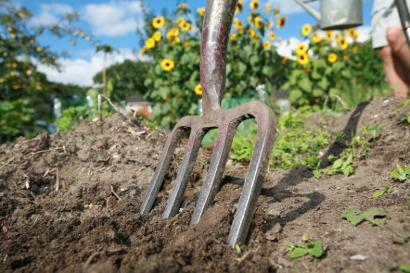Day 37, Year of #Mygration: Milton Keynes Community Allotment Project for Refugees

A grant from MK Community Foundation has allowed refugees and asylum seekers to participate in an allotment project in Milton Keynes. The ongoing project aims to improve the health and well-being of refugees and asylum seekers accessing Red Cross services.
The asylum process can be disempowering and outcomes uncertain and lengthy. Fear of being detained or returned to the country they fled can lead to depression and anxiety. Refugees and asylum seekers are at risk of isolation from the community due to stigmatisation and language barriers. These factors put the refugees and asylum seekers at risk of social isolation which can have a negative impact on their psychological and physical wellbeing.
The allotment project helps refugees and asylum seekers adjust to living in the UK by helping them to establish identities and roles, which may have been lost during the transition of leaving their home country and arriving in the UK. The allotment project aims to prevent occupational and social isolation/deprivation through engagement in meaningful activity. This has been achieved by providing a safe, non-judgemental environment using the activity of gardening for service users to improve their social capital while learning new skills, maintaining existing skills, practice language skills, form friendships and share knowledge for the good of others in the community. Addressing the health and wellbeing of refugees and asylum seekers through participation in a meaningful activity can increase their volunteering opportunities and possibly lead to future employment.
The refugees and asylum seekers have benefited from the Stepping Stone project in a number of ways. Their physical health as well as mental wellbeing has been improved by the engagement with the allotment. Due to the asylum process being long and involving the possibility of being detained or deported, this can result in anxiety and depression. This, combined with the issue of isolation when moving to a new community has been reduced from this experience.
The allotment project, based in Crownhill, achieved this by providing an interactive activity, which has created a non-judgemental environment, which promotes social inclusion. The asylum seekers and refugees have also maintained the existing skills and developed new skills such as learning English. In addition, the allotment is helping the wider community.
As one of the participants said: "I have been here from the beginning. It allows us to be ourselves and share ideas. We learn how to do new things, meet different people and hear their ideas. In Africa, we do things differently, so I am learning new ways of doing things."
Another person mentioned: “"It's great for me, I met a lot of people. In the future I will be able to do these etchings on my own. I have learned a lot. The place is quiet and peaceful, we have freedom to talk and the people are cheerful."
So far, a small grant has covered the start-up costs of the Stepping Stone project. This has assisted refugees and asylum seekers to adapt to living in the UK by introducing them to those in similar situations and to develop identities and responsibilities which were lost when leaving their own country. The costs covered included the purchase of materials and tools and the provision of transport for those who have required it.
Open University staff who are interested in joining or supporting the allotment project can find more information by contacting the local Red Cross:
Refugee Support, Milton Keynes
Unit 3 Joplin Court
Sovereign Business Park
Crownhill, Milton Keynes
MK8 0JP
Thames Valley Refugee Support Helpline: 0300 333 5393
Contact our news team
For all out of hours enquiries, please telephone +44 (0)7901 515891
Contact detailsNews & articles
AI sheds new light on dinosaur footprints
A new publication introduces a transformative AI approach to studying dinosaur footprints, offering researchers (and enthusiasts!) an objective way to classify tracks and investigate the conditions in which dinosaurs lived.